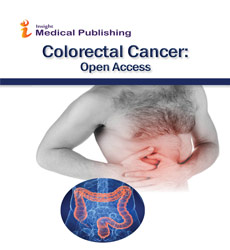Screening is the Most Effective Preventive Measure against Colorectal Cancer
Asael Ruelas Vaquera
DOI10.21767/2471-9943.100034
Asael Ruelas Vaquera*
Alfa Scientific Designs Inc., 13200 Gregg St, Poway, CA 92064, USA
- *Corresponding Author:
- Asael Ruelas Vaquera
Alfa Scientific Designs Inc., 13200 Gregg St, Poway, CA 92064, USA.
Tel: 6197521955
E-mail: asael@ignitevisibility.com
Received date: March 20, 2017; Accepted date: April 05, 2017; Published date: April 11, 2017
Citation: Vaquera AR. Screening is the Most Effective Preventive Measure against Colorectal Cancer. Colorec Cancer 2017, 3:1. doi:10.21767/2471-9943.100034
Introduction
According to the American Cancer Society, an estimated 135,430 people will be diagnosed with colon cancer in 2017 alone. There’s no denying how much of a problem colorectal cancer has become, but what many people don’t realize is that it is a highly preventable disease. Simple screenings can go a long way in treating colon cancer and often times, prevent it altogether.
Here’s a Look at a Few Reasons You Should Make Regular Colon Cancer Screenings a Priority in Your Life
Top 3 Reasons to Test for Colon Cancer.
Reduce the risk
Risk reduction remains the top reason to regularly test for colon cancer. Early colon screenings can lead to the detection of polyps. These polyps are noncancerous growths that can be found along the linings of the colon. While polyps aren’t inherently cancerous on their own, they do serve as an early warning sign to doctors that there is a prevalent risk of future colon cancer development. Participating in regular, early colon screenings reduces the risk of detecting these polyps and in turn, reduces the likelihood of colon cancer.
Furthermore, the removal of these polyps can be done through minimally invasive procedures, such as a colonoscopy. Polyp removal also plays a vital role in preventing the cancer from spreading to other organs throughout the body.
Increased survival rates
While the prevention of colon cancer altogether stands firmly as the top reason to have yourself tested for the disease, there are no doubt times when the cancer is found to be present during the test. Luckily, early discovery of colon cancer increases the fiveyear relative survival rate to roughly 90 percent.
The unfortunate factor in this statistic is the fact that, the vast majority of those suffering from colorectal cancer do not discover it until a far later stage. In fact, only 40 percent of colorectal cancer patients discover it at these early stages. As with most cancers, the earlier the disease can be discovered, the more likely it is that it can be treated.
Simple screenings
Perhaps the best reason to opt for an early colon cancer screening these days is how much simpler the procedure has become. While many dread the thought of a colon cancer screening, these people often don’t realize how simple the procedure can be. Technologies like the fecal occult blood (FOB) test have become a popular choice for those looking to address their colon health in a more convenient manner.
A FOB test looks for blood within a stool sample. If blood is found within the stool, doctors will work to find the source of the blood in order to determine if there are polyps or colon cancer itself present. There are a wide variety of home kits that can be purchased at a pharmacy or prescribed by a doctor in order to perform this test, with newer tests even delivering results in as quick as a single minute.
A change of eating habits
Participating in early and regular colon cancer screenings will no doubt go a long way in detecting the presence of cancer. This fact cannot be denied, but screenings only play a small part in what should be considered a holistic cancer prevention regiment. In fact, there are simple steps that can be taken right now that will help prevent the onset of the disease.
The food we consume plays a serious role in the overall status of our colon health. According to research conducted at the John Hopkins Colon Cancer Center, there are certain foods that can increase the likelihood of developing colon cancer and others that can help to prevent it.
Reducing the amount of saturated fats, salty foods, and alcohol consumed has shown to help in the prevention of colon cancer. Conversely, the increased consumption of colorful fruits and vegetables as well as fresh fish has been linked to healthy colon health. These foods tend to be rich in vitamins, minerals, and antioxidants that aid in the prevention of colon cancer and should be consumed regularly in order to maximize their effectiveness. Through participation in early colon screenings and a more focused diet, the prevention of colon cancer is far more achievable today than it has ever been.
Open Access Journals
- Aquaculture & Veterinary Science
- Chemistry & Chemical Sciences
- Clinical Sciences
- Engineering
- General Science
- Genetics & Molecular Biology
- Health Care & Nursing
- Immunology & Microbiology
- Materials Science
- Mathematics & Physics
- Medical Sciences
- Neurology & Psychiatry
- Oncology & Cancer Science
- Pharmaceutical Sciences
